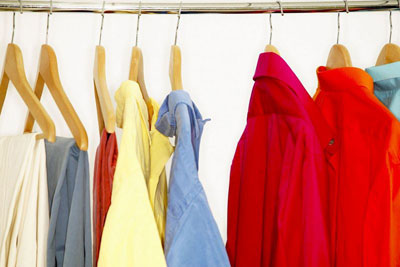(单词翻译:单击)
情景对话
Todd: Hey, Marion, I like you outfit. Nice jeans and T-shirt.
托德:嘿,马里昂,我喜欢你的衣服。牛仔裤和T恤真漂亮。
Marion: Oh, thank you.
马里昂:哦,谢谢你。
Todd: Where did you get it?
托德:你是哪里买的?
Marion: Actually, my T-shirt is a hand-me-down from a friend of mine who's leaving so she gave me some of her clothes.
马里昂:实际上我的T恤是我朋友给我的二手衣服,我朋友要离开了,所以她把她的一些衣服给了我。
Todd: Oh, really. Ah, OK. See, that's cool, like if I know the person who wore the shirt before, I'll wear it, but I will never go to a second hand clothing store or a used clothing store (Really) I think that's disgusting.
托德:哦,是吗?这很酷,如果我知道以前穿这件衣服的人是谁,我会穿这件衣服,所以我从来不去二手服装店或旧衣店(是吗),我觉得那很恶心。
Marion: Why?
马里昂:为什么?
Todd: Well, I mean, you don't know who wore it before.
托德:我的意思是,你不知道那些衣服以前谁穿过。
Marion: But they're washed, Todd. You know!
马里昂:可是托德,他们会清洗那些衣服的。你知道的!
Todd: Yeah, but, OK, first of all, what if the person who wore it was just the type or person you really hated. There's something about the person that you just really didn't like, and then, now you're wearing that person's clothes. Doesn't that disgust you?
托德:我知道,可是,首先来说,以前穿过那件衣服的人可能就是你最讨厌的那种人。你真的非常不喜欢那个人的某些方面,可是现在你却穿着那个人穿过的衣服。你不会觉得那很恶心吗?
Marion: No, do think a person's personality rubs off on their clothes (No, but) and then it survives the wash cycle in your washing machine?
马里昂:不,你是认为一个人的性格会传递到衣服上吗?(不是,可是……)而且还会在你用洗衣机清洗后继续存在?
Todd: OK. Right. Right. I see what you're saying, but I'll put it to you this way. Imagine that you work with somebody.
托德:好吧。我明白你的意思了,我这样说吧。想象一下你和某个人一起工作。
Marion: Yes.
马里昂:好。
Todd: Ok, at your job, is there somebody that you don't like.
托德:你的工作环境中有没有你不喜欢的人?
Marion: Yes.
马里昂:有。
Todd: OK, now imagine that there's a clothing bin and people can put clothes in there and you see a shirt and you like it, and you're just about to take it and someone says, that's that persons shirt. Would you still take it?
托德:好。现在想象有一个衣物箱,人们可以把衣物放进去,你看到了一件喜欢的衬衫,你刚要去拿那件衣服,就听到有人说那是那个你讨厌的人的衬衫。你还会拿吗?
Marion: Mm, I probably wouldn't.
马里昂:嗯,我可能不会拿了。
Todd: Right. See. See.
托德:你看吧,就是这样。
Marion: Yeah, but only because I wouldn't want to feel like that person had done me a favor in some way. (Right) I wouldn't want to be beholden to that person if I don't like them.
马里昂:嗯,这仅仅是因为我不想有那个讨厌的人以某种方式帮了我一个忙这种感觉。(对)如果我不喜欢那个人,那我就不想欠他的人情。
Todd: Right. Yeah. I mean, I don't know. I guess it's good to have second hand clothes if people don't have anything, you know for charity and things like that.
托德:对。我也不清楚。我想如果有人什么都没有,那去慈善商店之类的地方买二手衣服是不错的选择。
Marion: Yeah. Well, actually, when I was in college, I didn't have very much money, so the only clothes I could buy were second-hand clothes so I actually really got to like going around the charity shops and finding clothes that I really liked, so nothing that was following the trends of the moment, but in college that really doesn't matter. I think it's better to wear something if you feel comfortable in, and I think there's a real sense of achievement when you find something that you've wanted for God-knows-how-long, for example, I found a brown suede jacket one time in a charity shop, and I thought, "Oh, my God. This is exactly the type of suede jacket that I have been longing for", but I could never afford that jacket at full-price, even at half-price in a normal shop. I could never have had it, so actually most of my wardrobe at home is second hand clothes I would say, and I love it. I will go to a second hand clothes shop before a normal clothes shop any day. It's so much more fun.
马里昂:对。实际上我上大学时没有什么钱,当时我唯一买得起的衣服就是二手衣服,所以我喜欢逛慈善商店,在那里买我喜欢的衣服,当时完全没有追随潮流的想法,这在大学期间没什么问题。我认为穿衣服舒服更重要,找到一件你一直想找的衣服会有一种成就感,举例来说,有一次我在一家慈善商店发现了一件棕色绒面夹克,当时我想:“哦,天哪。这就是我一直想要的那件绒面夹克”,可是我买不起普通商店原价卖的这种夹克,即使是半价促销我也买不起。我不可能买得起,所以实际上我家里衣柜里的大部分衣服都是二手衣服,但是我很喜欢。哪天我在逛普通服装店时要先去趟二手服装店,那会有很多乐趣的。
Todd: Well, that's very interesting. You have fun shopping at those stores.
托德:那真是非常有意思。你会在那些服装店度过愉快时光的。
Marion: I will.
马里昂:我会的。

译文属可可原创,仅供学习交流使用,未经许可请勿转载
重点讲解
重点讲解:
1. hand-me-down
别人用过的东西;(尤指)旧衣物;
eg. Edward wore Andrew's hand-me-downs.
爱德华穿安德鲁穿过的旧衣服。
eg. Most of the boys wore hand-me-down military shirts from their fathers.
多数男孩子穿着自己父亲穿过的旧军装衬衫。
2. first of all
第一;首先;
eg. First of all we must identify the problem areas.
首先我们必须找出问题所在。
eg. First of all, allow me to extend to you my warmest welcome.
首先,请允许我向你们表达我最热烈的欢迎。
3. rub off on
影响;感染;
eg. He was a tremendously enthusiastic teacher and that rubbed off on all the children.
他是一个满腔热情的老师,他的热情也感染了所有的孩子。
eg. Jimmy is wery lucky; I wish some of his luck would rub off on me.
吉米非常幸运,我希望他的好运气能传给我一些。
4. be about to do sth.
即将(做…)的;快要(发生…)的;
eg. She was about to explore another life with Frank.
她将和弗兰克一起去开辟新的生活。
eg. It's rather tough on him falling ill just as he's about to go on holiday.
他正要去度假却生病了,真倒霉。
5. do sb. a favor
恩惠;帮忙;
eg. She implored me to do her a favor.
她恳求我帮她这个忙。
eg. He is always ready to do his classmates a favor.
他总是乐于帮助同学。
6. in some way
在一些方面;在某种意义上;
eg. She was very striking but in some way I felt repelled.
她非常引人注目,但我觉得她有些讨厌。
eg. We may be able to help you out in some way .
在某些方面我们或许可以帮助你。
7. be beholden to
欠…人情的;受…恩惠的;对…负有义务的;
eg. He was made beholden to the Mafia.
他受过黑手党的恩惠。
eg. She didn't like to be beholden to anyone.
她不愿欠任何人的情。
8. long for
渴望;渴求;企盼;
eg. Senior citizens long for a more predictable and secure future.
老年人渴望有一个更稳定、更可预见的未来。
eg. I am longing for quiet rural life.
我极想过清静的乡村生活。


